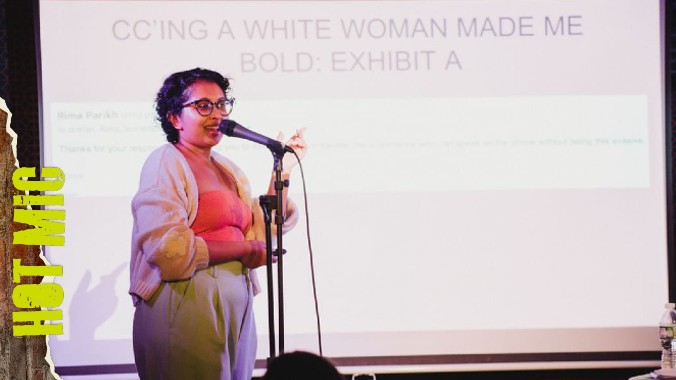Rima Parikh’s ‘Death Threat’ Goes Beyond the Trauma Plot
Parikh’s solo show about her cancer diagnosis—and the homicidal tendencies that emerge when dealing with corporate HR reps—is so tightly written and unexpected, it’s like watching someone land 10 backflips in a row without touching the ground.
Photo: Noah Eberhart Entertainment
Is cancer funny? Veteran comedy fans will recognize this question, most likely from Tig Notaro’s 2012 set Live, where she walks onstage and introduces herself with: “Hello. Good evening, hello. I have cancer.” She’d been diagnosed with breast cancer four days prior, after a year of additional health struggles and personal tragedies. She had no plans to release that set as a special, but the owner of the Largo happened to record it. The Guardian called it “jaw-dropping,” Slate called it “instantly legendary,” and Entertainment Weekly named it the best comedy album of 2012. So it seems that yes, cancer can be funny.
But you can still hear the hesitation, the deep uncertainty in the audience’s reaction to Notaro’s set: Should they be laughing at these horrible things she is saying? Should any of us? “Tragedy plus time equals comedy,” Notaro said in her set. “I’m just at the tragedy right now.”
All of this was on my mind when I showed up to Rima Parikh’s solo show, Death Threat: A Cancer Story at Caveat in the Lower East Side. In the middle of a broader cultural reckoning with the “trauma plot” and the power—or pointlessness—of confessional art, how does a comedian touch tragedy in a way that doesn’t feel corny, melodramatic, or self-indulgent on the one hand…or flippant, shallow, dismissive on the other? It feels like asking someone to do ten backflips in a row without touching the ground. And in Parikh’s case, they’re also recovering from fucking cancer.
Forgive me for pitting two cancer survivors against each other but I did wonder how Parikh would tell her own story of diagnosis, treatment, and remission without trying to emulate or live up to Notaro, or disappear into her long shadow. What’s more, my friend Aliza and I went to the show straight from a Washington Square Park protest in solidarity with Palestine. We were soaked to the bone with rain; our minds occupied by a raging genocide. I worried laughing at all would feel wrong.
But it turns out Parikh’s solo show was beyond comparison, beyond a reduction to any neat plot, trauma or otherwise, despite the fact that it does begin with a confession. “In late 2023, I sent an email, that I now understand. That I now acknowledge. That I now recognize. Was construed as a ‘death threat.’”
-

-

-

-

-

-

-

-

-

-

-

-

-

-

-

-

-

-

-

-

-

-

-

-

-

-

-

-

-

-

-

-

-

-

-

-

-

-

-

-








































